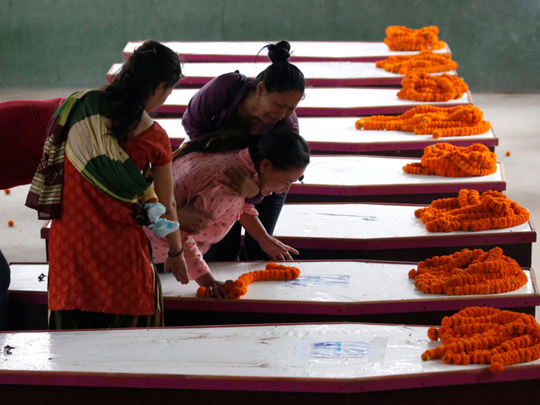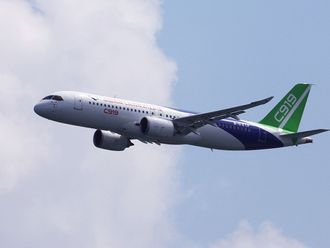
KABUL, Afghanistan: With their wraparound sunglasses and easy smiles, the Nepalese contractors who guarded the Canadian Embassy had become respected fixtures in Kabul, part of a larger community of South Asian security guards who stood sentry at foreign missions all around the capital.
Driven to work in Afghanistan by collapsed economic prospects back home, the contractors were able to send desperately needed money back to their families. But nothing here is without risk.
Last week, a Taliban suicide bomber killed 15 men, 13 Nepalese and two Indian contractors who helped secure the embassy, striking the guards’ commuter bus just after it had picked them up at their residence compound. It was one of the deadliest attacks on foreign workers in the capital — and another example of how the South Asian contractors who have become mainstays in places like Afghanistan and Iraq are vulnerable in ways that many of their Western counterparts are not.
Restrictions
Many of the Nepalese guards had worked for months just to recover the thousands of dollars in broker fees they had paid to secure jobs in Afghanistan. One of the guards, Prem Bahadur Tamang, 38, said that they enjoyed fewer privileges in their barracks than their “white brothers.”
He added that among other restrictions, for instance, they were prevented from leaving their compound to go to a store.
And they were shuttled around Kabul in ordinary minibuses, not in the armoured cars that protect many western contractors.
The bodies of the latest victims arrived in Nepal last Wednesday. The prime minister, K.P. Sharma Oli, laid garlands of marigold on the white and red coffins, one by one. Around him, relatives of the security guards sobbed or collapsed.At least 24 security guards who had worked at the Canadian Embassy in Kabul accompanied the bodies home, shaken by the deaths and angered that their entreaties for better protection on the roads had been ignored.
“I lost longtime friends,” said one of the guards, Mani Ram Khanal, a 17-year veteran of the Nepalese army who returned to Nepal and called the bombing “the most shocking incident of my life.” He said fewer of his colleagues would have died “if safer vehicles were used to transport security guards from one place to another,” adding that the guards had complained about the buses. “They did not take it seriously,” he said.
In response to questions about the Canadian Embassy’s use of the minibuses, a spokeswoman for Global Affairs Canada said in an email message that she could not comment on specific security measures at the mission. She said the agency took the safety of its personnel seriously and did continuous, rigorous reviews of risk.
Sabre International, a private security firm contracted by the Canadian Embassy to provide security at the mission, did not return messages and phone calls seeking comment. Other foreign missions, including the British Embassy, also used minibuses rather than armoured vehicles to transport Nepalese contractors, several guards said. A spokesman for the British Embassy declined to comment, citing security concerns.
About 150 Nepalese guards worked for Sabre in Afghanistan before the bombing, Tamang said. Thousands of other contractors, including veterans of British, Indian or Nepalese Gurkha units, are working around the country for similar firms.
Tamang said he had worked for the company for five years but abruptly returned home after the attack last week — with barely any of his clothes, saying he was still owed 20 days of wages. Other colleagues in Kabul were also considering going back to Nepal, he added.
It was not an easy choice, he said, after desperation had driven many of them to Afghanistan in the first place. “We have no job opportunities in Nepal,” Tamang said, adding that he had paid a broker the equivalent of about $3,300 (Dh12,120) to get to Kabul, where he was paid $950 a month — a fraction of the salaries paid to Western security contractors. Some of the Nepalese guards hoped to build a house. Others, like Tamang, were trying to rebuild their lives after Nepal’s devastating earthquake last year.
The family of Lil Bahadur Gurung, another victim of the bombing, had been forced to live in a makeshift shelter after their home was destroyed, and was waiting for Gurung to send money home so they could rebuild, according to his daughter, Anita Gurung. “Our family lost our breadwinner,” she said.
Beyond need, there is also the allure of tradition for some who go abroad. Nepalese Gurkhas, renowned for their fearlessness, have served in the British army since the 19th century. In today’s war zones, the willingness of the Gurkhas to serve long hours in the most dangerous posts is a source of pride for the soldiers, and it has kept them in high demand.
Three days after the attack, the Nepalese government announced that it would restrict the travel of its citizens to Afghanistan and facilitate trips for those who wanted to return. But the regulations are seen as easy to circumvent, and conditions in Nepal are only becoming more desperate, said Laxman Basnet, the Nepal-based general secretary of the South Asian Regional Trade Union Council.
— New York Times
News Service












